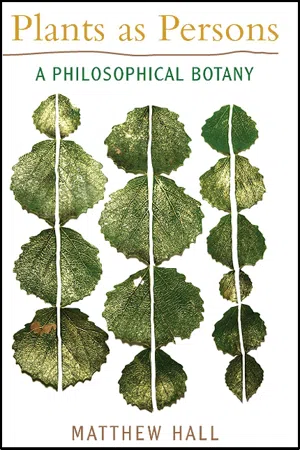
- 245 pages
- English
- PDF
- Available on iOS & Android
About this book
Challenges readers to reconsider the moral standing of plants.
Plants are people too? No, but in this work of philosophical botany Matthew Hall challenges readers to reconsider the moral standing of plants, arguing that they are other-than-human persons. Plants constitute the bulk of our visible biomass, underpin all natural ecosystems, and make life on Earth possible. Yet plants are considered passive and insensitive beings rightly placed outside moral consideration. As the human assault on nature continues, more ethical behavior toward plants is needed. Hall surveys Western, Eastern, Pagan, and Indigenous thought as well as modern science for attitudes toward plants, noting the particular resources for plant personhood and those modes of thought which most exclude plants. The most hierarchical systems typically put plants at the bottom, but Hall finds much to support a more positive view of plants. Indeed, some indigenous animisms actually recognize plants as relational, intelligent beings who are the appropriate recipeints of care and respect. New scientific findings encourage this perspective, revealing that plants possess many of the capacities of sentience and mentality traditionally denied them.
Frequently asked questions
- Essential is ideal for learners and professionals who enjoy exploring a wide range of subjects. Access the Essential Library with 800,000+ trusted titles and best-sellers across business, personal growth, and the humanities. Includes unlimited reading time and Standard Read Aloud voice.
- Complete: Perfect for advanced learners and researchers needing full, unrestricted access. Unlock 1.4M+ books across hundreds of subjects, including academic and specialized titles. The Complete Plan also includes advanced features like Premium Read Aloud and Research Assistant.
Please note we cannot support devices running on iOS 13 and Android 7 or earlier. Learn more about using the app.
Information
Table of contents
- PLANTS AS PERSONS
- CONTENTS
- ACKNOWLEDGMENTS
- A PHILOSOPHICAL BOTANY
- 1. THE ROOTS OF DISREGARD
- 2. DOGMA AND DOMINATION
- 3. PASSIVE PLANTS IN CHRISTIAN TRADITIONS
- 4. DEALING WITH SENTIENCE AND VIOLENCE IN HINDU, JAIN,AND BUDDHIST TEXTS
- 5. INDIGENOUS ANIMISMS,PLANT PERSONS, AND RESPECTFUL ACTION
- 6. PAGANS, PLANTS,AND PERSONHOOD
- 7. BRIDGING THE GULF
- RECREATING A PLACE FOR FLOURISHING
- NOTES
- BIBLIOGRAPHY
- INDEX